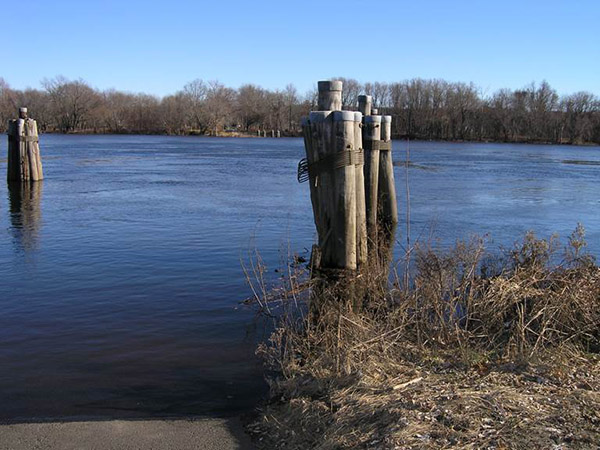Sen. Lesser, Rep. Wood Welcome State Investment
in Historic Rocky Hill-Glastonbury Ferry

ROCKY HILL – State Senator Matt Lesser (D-Middletown) and state Rep. Kerry Wood (D-Rocky Hill) today welcomed news that the State Bond Commission is poised to approve $4 million in repairs to the ferry slip areas at the Rocky Hill-Glastonbury and the Chester-Hadlyme commuter ferries on the Connecticut River when the commission meets next week in Hartford.
The money – about $2 million at each ferry site – will be used to install new ferry slip dock pilings and wave screens to replace the existing broken or rotting pilings, which are approaching two-thirds of a century old. The pilings are used to guide the barges and diesel-powered tugboats toward the dock and its waiting passengers; the pilings also help prevent river debris (i.e. trees) from damaging the docks.
“I’m pleased to see the state continue its commitment to the history and commuter convenience that these ferries represent. The Rocky Hill-Glastonbury ferry is a landmark and an incredible part of our history. I don’t think it’s too much to ask to replace some broken and rotting pilings every century or so in the name of public and maritime safety,” Sen. Lesser said, “And so I’m grateful to the support of Governor Lamont and the Bond Commission.”
“I would like to thank the Bond Commission and Governor Lamont for their support. There is a limited window of time for the improvements to be completed, and this funding ensures the ferry will be operable for the peak travel season,” said Rep. Wood. “Upgrading the ferry’s aging and crumbling infrastructure is essential in protecting the safety of passengers, but also connecting these two communities.”
The trees used in the new pilings are very specific: they are Greenheart trees, grown mainly in the South American countries of Guyana and Suriname. Greenheart is one of the stiffest woods in the world, and is very rot resistant: it is considered to be one of the best-suited woods for use in marine environments, such as docks and pilings.
The trees typically grow to be about 100 feet high and two feet in diameter. Sections of the trees will be grouped together and driven about a dozen feet below the base of the Connecticut River; the work will be done over the winter in order to reduce any potential impact on spawning fish. Construction is anticipated to start in late November and be completed in late March 2020.
The ferry service between Rocky Hill and Glastonbury is America’s oldest continuously operating ferry, dating back to 1655 when small raft was pushed across the Connecticut River using long poles. Today’s ferry is an open flatboat named the “Hollister III”; this three-car barge is towed back and forth by the “Cumberland,” a diesel powered towboat. Motorists traveling between parts of south Glastonbury and Rocky Hill can cut nearly 8 miles (one-way) off their trip if they use the ferry.
The Chester-Hadlyme ferry began service in 1769, and was often used throughout the Revolutionary War to transport supplies across the Connecticut River. The present ferry, the Selden III, was built in 1949. It is an open, self-propelled craft 65 feet long and 30 feet wide that can accommodate 8 or 9 cars and 49 passengers. The ferry ride is actually a continuation of Route 148, from Chester to Hadlyme: ferry commuters can save 12 miles (one-way) when taking the ferry compared to driving on Route 148.
The two ferries operate April 1 through November 30, Tuesday thru Friday from 7:00 a.m. to 6:45 p.m. and on weekends from 10:30 a.m. to 5:00 p.m. Fees are $5 per vehicle weekdays, $6 per vehicle on weekends, $3 for commuters with pre-purchased coupons, and $2 for pedestrians and bicyclists.
Share this page:
